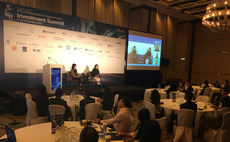
Play the man
Denham Capital's investment in Pembroke Resources appears to follow a standard pattern: Find a management team with a track record of building and selling resources companies; furnish them with start-up capital to accumulate a portfolio of assets; provide more capital as projects mature; take the holding vehicle public once it reaches a sufficient scale or sell it to a strategic buyer. And then repeat.
The sums of money and assets involved are the polar opposite of venture capital but there are similarities in the underlying approach. The investor is backing a person or group of people with nothing more than an idea and a plan to monetize it, but they have done it before so there is every chance they can do it again.
To put it crudely, a tech entrepreneur draws a business plan on the back of a napkin based on an angle or market niche that is currently unexploited. A commodities veteran might use the same napkin to draw a map identifying the location of resources that are either beyond the reach or execution ability of others in the market.
In the case of Pembroke, Denham is backing Barry Tudor, whose team turned Australia-based Gloucester Coal into a champion in the space of three years thanks a number of savvy acquisitions.
Kerogen Capital did much the same in March when investing in Twinza Oil, a company with assets including a 90% interest in a shallow water gas and condensate appraisal in Papua New Guinea (PNG). It is at an early stage of development but PNG is emerging as a hot property for liquefied natural gas. And then Twinza is controlled by the Clough family, founders of Clough Engineering, an engineering, construction and support services provider for resource projects in Australia and PNG.
Indeed, First Reserve's first two deals in Asia came through ties to the same strain of experienced operators. The PE firm invested in Whitehaven Coal through a company called AMCI Capital. Two people who had spun out of AMCI then introduced First Reserve to Calibre Global, which provides engineering, procurement, construction and management services to mining companies in Western Australia.
Investments of this nature flounder without specialist skills and local knowledge. A relatively small community of people is in possession of both and an equally small collection of private equity firms has an appetite for direct exposure to resources. Little wonder they are close knit, often working with each other on multiple occasions.
What the aforementioned deals have in common is a degree of Australian heritage. We have yet to see a spate of private equity-backed oil and gas explorers emerge in Southeast Asia, despite growing interest in the region's gas reserves and an established group of multinationals that can provide the requisite spin-out talent. The honorable exceptions are Pearl Energy, Salamander Energy, Mitra Energy and KrisEnergy, although the same team was behind Pearl and KrisEnergy.
One reason for the relatively strong representation from Australia is its capital markets - like those in Toronto and London - have traditionally been more accommodating of resources start-ups than Hong Kong and Singapore. This makes it easier to raise additional capital as project moves through different phases of development, as well as giving PE backers an obvious exit channel, although markets react to commodity price swings.
Another explanation put forward by a head hunter operating in the space is that more corporates are looking to retain or recruit talent in house. These groups, sometimes structured as captive investment units, pursue assets they might otherwise have sought to develop as independents. It may also be that the Asian national oil companies are too dominant, the regulations in the region too opaque and the time required to get deals done too lengthy.
Or it might be just too soon. If the shale gas breakthrough in North America has taught us anything it is that technology has the ability to turn establish order on its head and make the unobtainable obtainable.
Latest News
Asian GPs slow implementation of ESG policies - survey
Asia-based private equity firms are assigning more dedicated resources to environment, social, and governance (ESG) programmes, but policy changes have slowed in the past 12 months, in part due to concerns raised internally and by LPs, according to a...
Singapore fintech start-up LXA gets $10m seed round
New Enterprise Associates (NEA) has led a USD 10m seed round for Singapore’s LXA, a financial technology start-up launched by a former Asia senior executive at The Blackstone Group.
India's InCred announces $60m round, claims unicorn status
Indian non-bank lender InCred Financial Services said it has received INR 5bn (USD 60m) at a valuation of at least USD 1bn from unnamed investors including “a global private equity fund.”
Insight leads $50m round for Australia's Roller
Insight Partners has led a USD 50m round for Australia’s Roller, a venue management software provider specializing in family fun parks.





